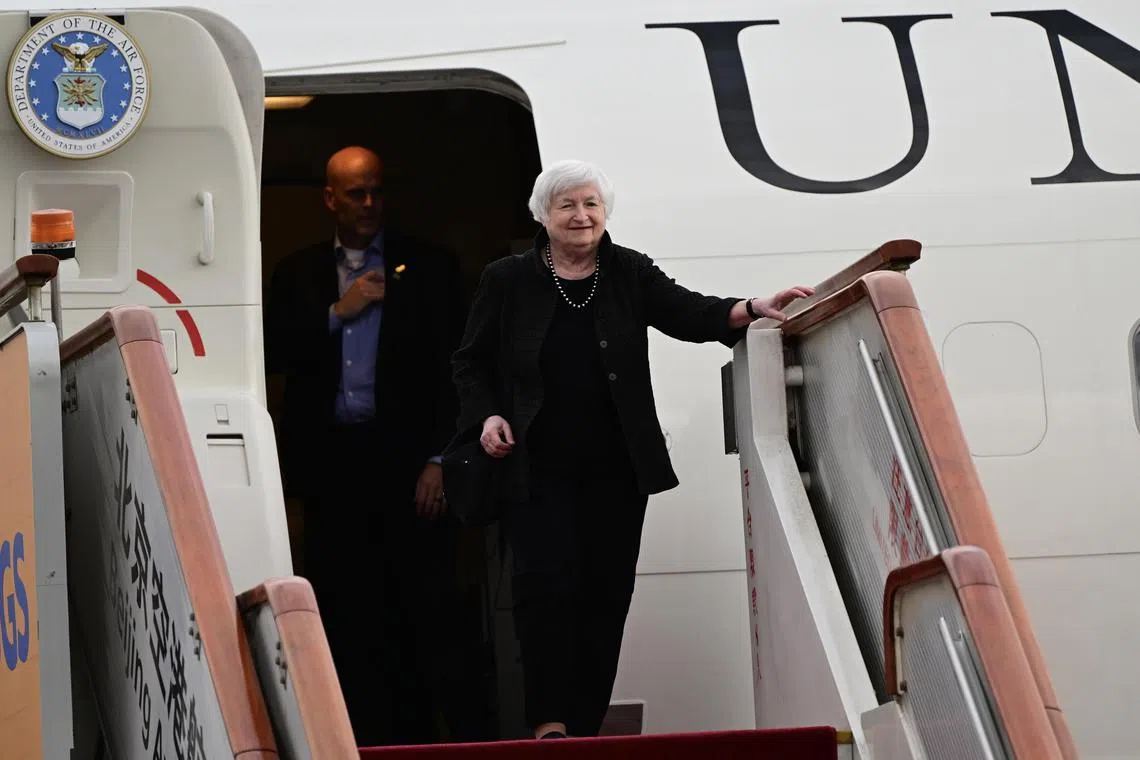Yellen criticises China’s ‘punitive’ actions against US companies, urges market reforms
Sign up now: Get insights on Asia's fast-moving developments

US Treasury Secretary Janet Yellen arrived in Beijing on Thursday to try to repair fractious US-China relations.
PHOTO: EPA-EFE
BEIJING – US Treasury Secretary Janet Yellen on Friday called for market reforms in China and criticised the world’s second-largest economy for its recent “punitive” actions against US companies and new export controls on some critical minerals.
Dr Yellen arrived in Beijing on Thursday to try to repair fractious US-China relations, but made clear in her public remarks that Washington and its Western allies will continue to hit back at what she called China’s “unfair economic practices”.
She made the remarks to the American Chamber of Commerce (AmCham) in China after what a US Treasury official called “substantive” talks with former Chinese economy czar Liu He, a close confidant of President Xi Jinping, and outgoing top Chinese central banker Yi Gang.
The United States is seeking healthy competition with China based on fair rules that benefit both countries, not a “winner-takes-all” approach, Dr Yellen told Chinese Premier Li Qiang in a subsequent meeting on Friday.
She said she hoped her visit would spur more regular communication between the two rivals, and said any targeted actions by Washington to protect its national security should not needlessly jeopardise the broader relationship.
“We seek healthy economic competition that is not winner-takes-all but that, with a fair set of rules, can benefit both countries over time,” she said.
Dr Yellen and other US officials are walking a difficult tightrope of trying to repair fractious ties with China after the American military in February shot down a Chinese government balloon over the US,
US officials have downplayed the prospect of any major breakthroughs, while highlighting the importance of more regular communication between the world’s two largest economies.
China hopes the US will take concrete actions to create a favourable environment for the healthy development of bilateral economic and trade ties, China’s Finance Ministry said in a statement on Friday.
“No winners emerge from a trade war or from decoupling and ‘breaking chains’,” it added.
Mr Li told Dr Yellen a rainbow that appeared as her plane from Washington landed on Thursday offered hope for the future of US-China ties.
“I think there is more to China-US relations than just wind and rain. We will surely see more rainbows,” he said.
US firms in China hope the visit will ensure trade and commercial lanes between the two economies remain open, regardless of the temperature of geopolitical tensions.
AmCham China president Michael Hart welcomed Dr Yellen’s “extra firepower” in pressing for changes in China’s policies.
“Dr Yellen’s visit is significant because it allows more conversations to happen, it allows more mid-level folks from both sides to come,” he said. “I think if there was another year of no visits by top US government leaders, the market would get colder.”
The US diplomatic push comes ahead of a possible meeting between US President Joe Biden and Mr Xi as soon as September’s Group of 20 summit in New Delhi or the Asia-Pacific Economic Cooperation gathering scheduled for November in San Francisco.
US Secretary of State Antony Blinken visited China in June and agreed with Mr Xi that the mutual rivalry should not veer into conflict John Kerry is expected to visit later in July.
Dr Yellen told the US business executives that a “stable and constructive relationship” between the two countries would benefit US companies and workers, but Washington also needed to protect its national security interests and human rights.
Regular exchanges could help both countries monitor economic and financial risks at a time when the global economy was facing “headwinds like Russia’s illegal war in Ukraine and the lingering effects of the pandemic”, she added.
At the same time, she said, she would raise concerns with Chinese officials about Beijing’s use of expanded subsidies for state-owned enterprises and domestic firms, barriers to market access for foreign firms, and its recent “punitive actions” against US firms.
New Chinese export controls on gallium and germanium, critical minerals used in technologies like semiconductors, were also concerning, she said, adding that the move underscored the need for “resilient and diversified supply chains”.
Market reforms
Dr Yellen also took aim at China’s planned economy, urging Beijing to return to more market-oriented practices that had underpinned its rapid growth in past years.
“A shift towards market reforms would be in China’s interests.
“A market-based approach helped spur rapid growth in China and helped lift hundreds of millions of people out of poverty. This is a remarkable economic success story,” she told the AmCham event.
She noted that China’s enormous and growing middle class provided a big market for American goods and services, and stressed that Washington’s targeted actions against China were based on national security concerns.
“We seek to diversify, not to decouple,” she said.
“A decoupling of the world’s two largest economies would be destabilising for the global economy, and it would be virtually impossible to undertake.” REUTERS


